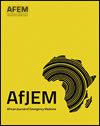Improving emergency care capacity with the WHO-ICRC Basic Emergency Care (BEC) course
IF 1.2
4区 医学
Q3 EMERGENCY MEDICINE
引用次数: 0
Abstract
Background
Globally, the demand for acute care is surging, disproportionately burdening low- and middle-income countries. Training for healthcare providers can play a pivotal role in reducing related mortality and improving overall health and well-being, particularly in sub-Saharan Africa. Despite the potential for impact, the World Health Organization- International Committee of the Red Cross (WHO-ICRC) Basic Emergency Care (BEC) course is yet to be fully rolled out in Francophone African nations such as Cameroon, Djibouti, Haiti, Morocco, and Tunisia. In this paper, we describe the introduction of this training in these countries.
Methods
This study utilized pre- and post-course surveys to gauge change in knowledge and confidence in delivering acute care. A comprehensive 4-day French BEC course and a concise 1-day Training of Trainer (ToT) course were delivered in Yaounde, Cameroon, in early 2023. Participants undertook surveys pre- and post-training, offering insights into their acute care knowledge, skills, and self-assurance.
Results
The courses were attended by 50 participants. The post-course evaluation highlighted a marked improvement in scores, showcasing a median score elevation from 72% pre-course to 88% post-course (p < 0.001). Participants’ self-confidence in handling acute care scenarios doubled. Universal acclaim was received for the quality of training materials, courses, and facilitation methodology, with nearly half feeling no amendment was necessary in the course design. However, 30% felt a longer duration should be dedicated to the practical/skills components of the course.
Conclusions
The WHO-ICRC BEC course significantly enhanced the acute care knowledge, skills, and self-confidence of participants from these five countries, laying a solid foundation for future training sessions. Provisional trainers are now proficient in expanding such training within their regions. Evaluating patient outcomes post-training presents significant challenges, highlighting a crucial area for future research and scrutiny.
通过世卫组织-红十字国际委员会基本紧急护理课程提高紧急护理能力
在全球范围内,对急症护理的需求正在激增,给低收入和中等收入国家造成了不成比例的负担。对保健提供者的培训可在降低相关死亡率和改善整体健康和福祉方面发挥关键作用,特别是在撒哈拉以南非洲。尽管具有潜在的影响,但世界卫生组织-红十字国际委员会(WHO-ICRC)的基本急救(BEC)课程尚未在喀麦隆、吉布提、海地、摩洛哥和突尼斯等非洲法语国家全面推行。在本文中,我们描述了这种培训在这些国家的介绍。方法本研究采用课程前和课程后的调查来衡量在提供急性护理的知识和信心的变化。2023年初,在喀麦隆雅温得举办了为期4天的法语BEC综合课程和为期1天的简明培训师培训(ToT)课程。参与者在培训前和培训后进行了调查,提供了对他们的急症护理知识、技能和自信的见解。结果50人参加了课程。课程后评估突出了分数的显著提高,显示中位分数从课程前的72%提高到课程后的88% (p < 0.001)。参与者在处理紧急护理情况时的自信心增加了一倍。培训材料、课程和促进方法的质量受到普遍好评,近一半的人认为课程设计不需要修改。然而,30%的人认为应该将更长的时间用于课程的实践/技能部分。世卫组织-红十字国际委员会BEC课程显著提高了这五个国家参与者的急症护理知识、技能和自信心,为今后的培训奠定了坚实的基础。临时训练员现在精通在其区域内扩大这种训练。评估患者培训后的结果提出了重大挑战,突出了未来研究和审查的关键领域。
本文章由计算机程序翻译,如有差异,请以英文原文为准。
求助全文
约1分钟内获得全文
求助全文
来源期刊

African Journal of Emergency Medicine
EMERGENCY MEDICINE-
CiteScore
2.40
自引率
7.70%
发文量
78
审稿时长
85 days
 求助内容:
求助内容: 应助结果提醒方式:
应助结果提醒方式:


